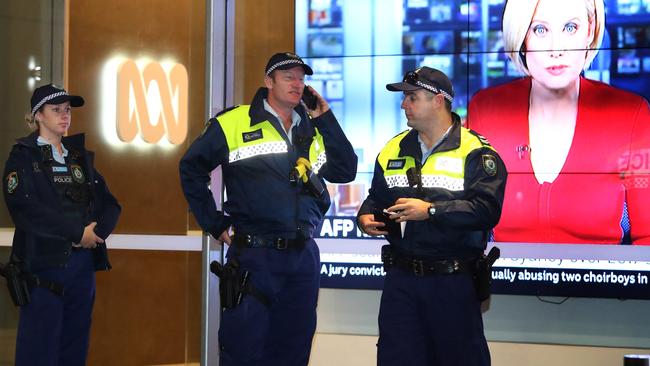Media raid alternative proposed by AFP, Home Affairs
Journalists and media organisations could avoid raids and argue against providing confidential documents under a new scheme.

Journalists and media organisations could avoid police raids and argue against providing confidential documents under a new scheme being proposed by the Australian Federal Police and Home Affairs Department.
In a joint submission to the Parliamentary Joint Committee on Intelligence and Security, the AFP and department have proposed a Notice to Produce framework with an independent body overseeing security agency requests for evidence from journalists and media companies.
The independent issuing authority falls short of what media companies have been lobbying for through their Right to Know campaign, which called for a legally contestable warrant.
“This would offer an alternative to executing a search warrant in person, give parties more flexibility to serve and produce material (such as electronically where appropriate),” the joint submission said.
“(It would also) provide an opportunity for professional journalists and media organisations to put forward any strong, countervailing arguments to not produce material pursuant to such an Notice.
“With reference to the Ministerial Direction, the Australian Federal Police should have the option to apply to an independent issuing authority for a Notice to Produce in relation to
investigations involving professional journalists or news media organisation.”
The new proposal comes after changes were floated last year in relation to how security agencies investigate and execute warrants on journalists following pressure from media organisations for greater press freedom in the wake of last year’s raids on the ABC Sydney headquarters and the home of News Corp Sunday tabloids political editor Annika Smethurst.
Under the proposed changes, the AFP would retain the right – through an independent issuing authority – to raid homes and offices if it believed materials could be “destroyed or concealed”, where there is an allegation of serious criminal wrongdoing by an employee or where there are “urgent operational circumstances”.

“Any framework should not limit the ability to apply for law enforcement to apply for a search warrant in those circumstances.”
“However, as conveyed by the Ministerial Direction, the Australian Federal Police are expected to exhaust alternative investigative actions prior to undertaking investigative action in relation to a professional journalist or media organisation when investigating the unauthorised disclosure of material or obtained by a current or former Commonwealth officer.”
The submission refers to other Notice to Produce frameworks across commonwealth and state legislation, which were used by agencies in both civil and criminal investigations.
“Further consideration would need to be given to the means by which a Notice to Produce framework would take into account public interest considerations.”
“This could include introducing a ground for challenging the production of documents in response to a notice, or other mechanisms providing an independent and impartial public interest assessment on the release of material to law enforcement.”
Examining overseas models in the US and Great Britain, the submission highlights that contestability only applied to “production order regimes … rather than to the issue of search warrants”.
Under US federal law, security agencies must first seek a subpoena, excluding other factors, to obtain access to journalists’ “documentary and work product materials”.
The AFP and Home Affairs department said it was “generally accepted that press freedom is not absolute” and that “broad immunity for journalists from the application of certain Australia laws … would not be appropriate”.
“A general immunity or exclusion from criminal offending could have implications for the confidence of our foreign partners in Australian agencies to maintain the integrity of sensitive information, and could incentivise unlawful information disclosures to the media,” the submission said.
“Law enforcement and intelligence sources also need to be confident that their activities and identities will be protected.”
The submission also said “international human rights law recognises that limitations on press freedom are permissible where they are reasonable, necessary and proportionate for the pursuit of a legitimate objective”. The AFP and Home Affairs department highlight this as being the “protection of the rights or reputations of others or the protection of national security”.





